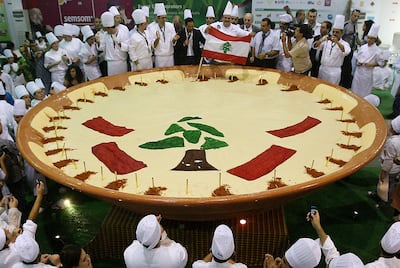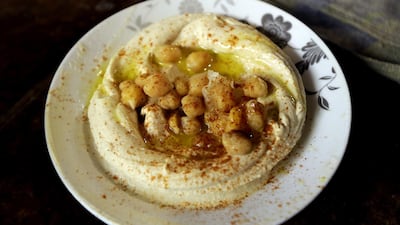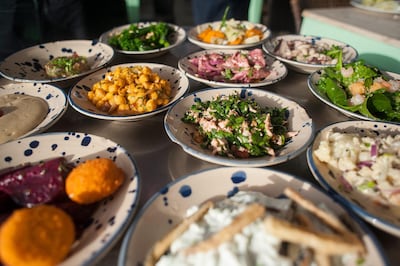One of the songs my toddler listens to as part of the endless loop of nursery rhymes that permeates our home these days starts like this:
'Do you like broccoli?/ Yes, I do, yes, I do/ Do you like ice cream?/ Yes, I do, yes, I do/ Do you like broccoli ice cream?/ No, I don't, yucky!'
This unflinching lesson in the art and discipline of food combinations is now more important than ever.
Not content with the extent of the calamity that is the year 2020, vandals have taken to the dark corners of the web in recent months, wielding an axe to a cherished symbol of many – the spartan but kingly hummus.
Horrific Frankenstein versions of the Middle Eastern mezze pop up on social media with alarming frequency, featuring such variants as dark chocolate mint dessert hummus.
This is akin to somebody taking the most perfect melody, elegant in its simplicity, and transmogrifying the sound into a fire drill, or pineapple jalapeno hummus.
It is far past time to take a stand and to talk about hummus.
Let us start with what hummus is: a traditional savoury dip popular in the Levant. It may have been invented in what is now Damascus.
One theory claims its progenitor was first conceived in Egypt as early as the 13th century, a fact that does not seem to have led to a subsequent renaissance in Egyptian cuisine.
It is made with chickpeas, tahini, olive oil, lemon, cumin and garlic. Most people eat it topped with olive oil and the occasional herb or spice.
A heartier version, which should be consumed on days when one does not expect to engage in any physical or mental labour afterwards, is topped with piping hot ghee, small cutlets of meat and toasted pine nuts.
That’s it. That is what hummus is. It is not something else, in the same way an apple is just an apple, not a lamb shank. In the same way Beethoven is not Ted Bundy.
Consequently, pureed chickpeas “infused with rich cocoa, organic sugar and vanilla” cannot in good conscience be called hummus, particularly if they can be enjoyed in the form of sweet treats or s’mores. A base of white or black beans, edamame, pumpkin, pineapple, jalapenos, ground turkey or jellybeans does not constitute hummus. It is not a label that can simply be applied to a broad class of variants and mean essentially the same thing, like “candy” or “terrorist”.
The entire saga reminded me of a somewhat similar debate on the naming conventions for different types of milk, such as the various nut milks or soy milk. Pressure by dairy industry lobbyists eventually succeeded in changing their names – here in Canada they are called beverages, as in “almond beverage.” In the immortal words of then US Food and Drug Administration commissioner Scott Gottlieb in 2018: “And, you know, an almond doesn’t lactate, I must confess.”
Over the past few weeks, I have dedicated an unreasonable amount of time to scouring the internet for examples of these crimes against hummus and calling out some of the egregious offenders on social media.

One Lebanese friend indicated that my relentless pursuit had reduced his quality of life by exposing him to unpleasant facts about the world. Yet by the same logic, we should all boycott newspapers because of the unending stream of bad news. Ignorance of the realities of a cruel world is not a remedy.
But it did make me question why I cared. We all have our food quirks. I tend to answer the question of “what does this need” with “more za’atar” regardless of the context.
I have an aversion to baguettes because they turn into a sharp weapon within four hours. When eating dishes that include multiple major components like rice, meat, yoghurt and vegetables, I tend to mix them all up and see what happens. I have no issue with eating dessert first – why wait until you are full?
I would be virtue signaling and lying if I pretended that this pursuit was over a high-minded objection – like, say, cultural appropriation – or the warping of a revered and beloved tradition into an instrument of senseless capitalistic gain and consumption, a process that robs a symbol of its unique traits and turns us all into faceless consumers of caramel and peanut butter hummus.
It is much simpler, more chauvinistic and pettier than that. Original hummus is perfect, and these variants are the equivalent of dousing a tender Kobe steak with ketchup.
It is time to take back hummus from the pretenders, though I feel it may already be too late. The train has left the station. Just like “literally” does not mean literally anymore and the battle for “awesome” has been lost.
Similarly, unless the purveyors of fake hummus stop, there will be strawberry hummus everywhere and the word hummus itself will lose all meaning.
Kareem Shaheen is a veteran Middle East correspondent in Canada and a columnist for The National



